Simon Wiesenthal Centennial Commemorative Society
April 13, 2009
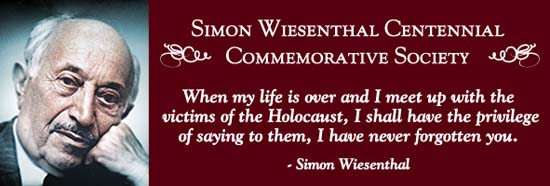 |
Honor Simon Wiesenthal’s 100 Year Anniversary by Joining the Simon Wiesenthal Centennial Commemorative Society
Who would have thought, ten years after Simon Wiesenthal spoke from the rostrum of the General Assembly about memory and tolerance, that Iran’s Ahmadinejad, a serial Holocaust denier, would be given a rousing ovation at the
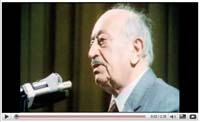 |
| Click here to view video... |
same podium by the world’s ranking diplomats.
Who could imagine that as we commemorate Simon Wiesenthal’s centennial, protestors on the streets of North America’s largest cities are carrying signs and chanting, “Jews to the ovens.” That is why it is crucial that the next generation step forward to carry on his work. That is why 100 years after his birth, we are establishing the Simon Wiesenthal Centennial Commemorative Society.
By becoming a founding member of the Simon Wiesenthal Centennial Commemorative Society you help continue his heroic legacy through the Simon Wiesenthal Center’s crucial work of combatting anti-Semitism, hatred and protecting the security of the Jewish people. As a member of the Centennial Commemorative Society you will be listed in a specially designated section of our website and will receive a DVD of “I Have Never Forgotten You: The Life & Legacy of Simon Wiesenthal”.
Simon Wiesenthal was born in Buczacz, Poland on December 31, 1908. He had planned a career as an architect. Instead, the Nazis invaded Europe and unleashed the Final
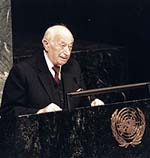 |
| Simon Wiesenthal speaking at the UN General Assembly |
Solution, trapping him and his wife in ghettos and concentration camps. Instead of sketching homes, he secretly sketched the faces of the murderers and compiled lists of names of those who had come to destroy the Jewish people.
After World War II when the whole world went home to forget, he alone remained behind to remember. He could not forget. He became the permanent representative of the victims of the Shoah. No one asked him to assume this role; he just assumed the job. It was a job no one else wanted.
The task was overwhelming. The cause had few friends. The WWII Allies were already now focused on the Cold War. The Holocaust survivors began rebuilding their shattered lives. Only Simon could not let go of those terrible memories: of the more than eighty members of his family that were wiped out, of chasing after the cattle car that carted his mother off to the death camp.
With sheer determination, he brought more than 1,100 Nazi war criminals to justice. Mass murderers like Franz Stangl, the commandant of Treblinka death camp, Gustav
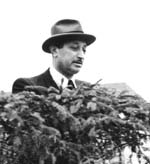 |
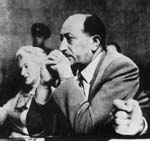 |
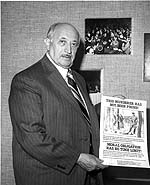 |
Wagner, the commandant of Sobibor death camp, Walter Rauff, the inventor of the mobile gas vans who counted amongst its victims the infirm and the handicapped, and Karl Silberbauer, the Nazi who had arrested Anne Frank.
When one looked into Simon’s eyes, you could see the sense of urgency with which he lived his life, as if he could still hear the footsteps of the millions walking beside him.
Yes, today if there is a place in our world for the memory of the Holocaust, Simon Wiesenthal was one of those who put it there.
At every opportunity, he reminded people about what is happening in our time – about the scourge of anti-Semitism that has returned stronger than ever – the threat of international terrorism – about the many intellectuals who call for the destruction of the State of Israel, even after Auschwitz.
No one did more than he did in bringing the perpetrators of history’s greatest crime to justice. No person devoted himself so absolutely, giving up all worldly and material pursuits and placing his family in harm’s way for the singular purpose of forcing the world to remember. For the victims of the Holocaust who perished, he returned to them the respect they were never accorded in life. Every survivor walked a little taller and felt more secure because Simon Wiesenthal was out there defending their honor and the honor of all those who perished.
World leaders honored him. When he met President Reagan in the Oval Office and said, "Mr. President, I am honored to meet you," President Reagan replied, "Sir, the honor is mine, not yours." He would always end his speeches by saying, “When my life is over and I meet up with the victims of the Holocaust, I shall have the privilege of saying to them, I have never forgotten you.”
There is no better way to honor Simon Wiesenthal than to support the work that he
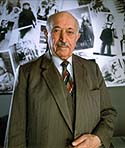 |
dedicated his life to. As Simon Wiesenthal often said, “I have received many honors in my lifetime but when I die, these honors will die with me but the Simon Wiesenthal Center will live on as my legacy.” Few times in history do we have the opportunity to honor a man who spoke for ‘the generations’ who labored, and toiled not only for those he knew, but for those he would never know and those not yet born.
Your support of the Simon Wiesenthal Centennial Commemorative Society ensures that each and every day we keep Simon Wiesenthal’s legacy alive by working to end anti-Semitism and hatred, by keeping alive the memory of the Holocaust through education, and by defending the safety of the Jewish people.
There has never been a more critical time.
- Regional Offices
- Los Angeles
- New York
- Midwest US
- Southern US
- Toronto
- Jerusalem
- Paris
- Buenos Aires

